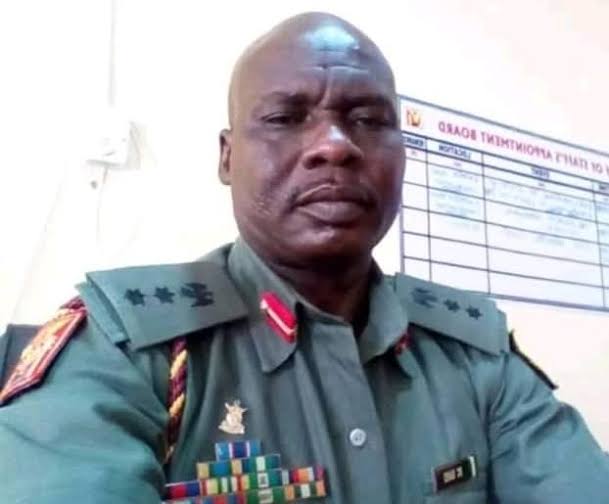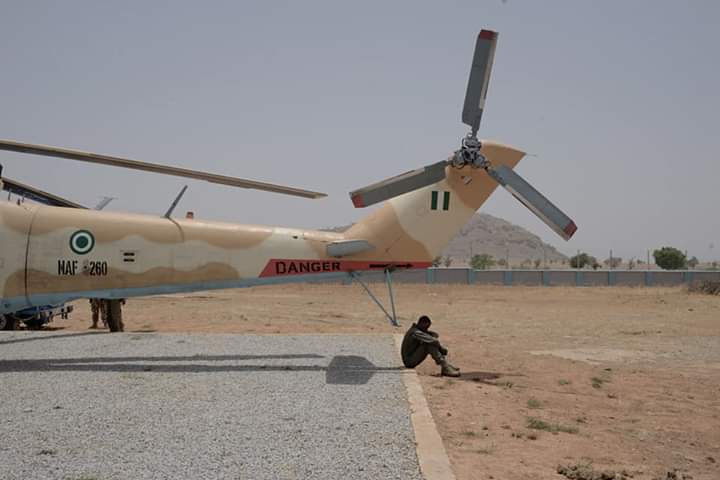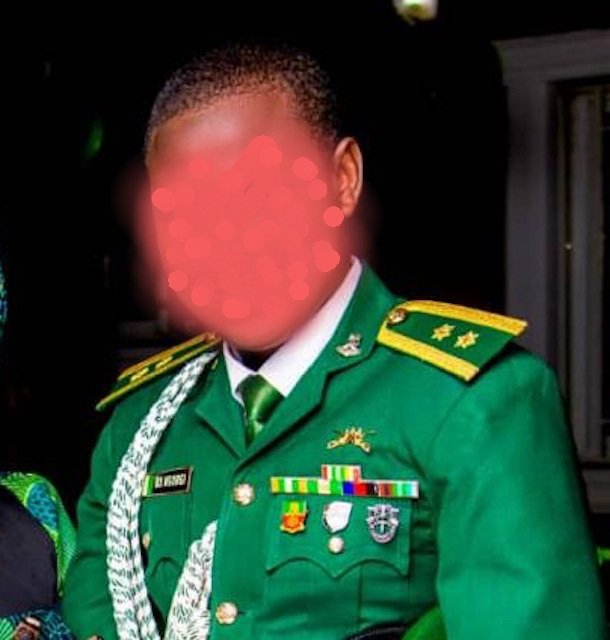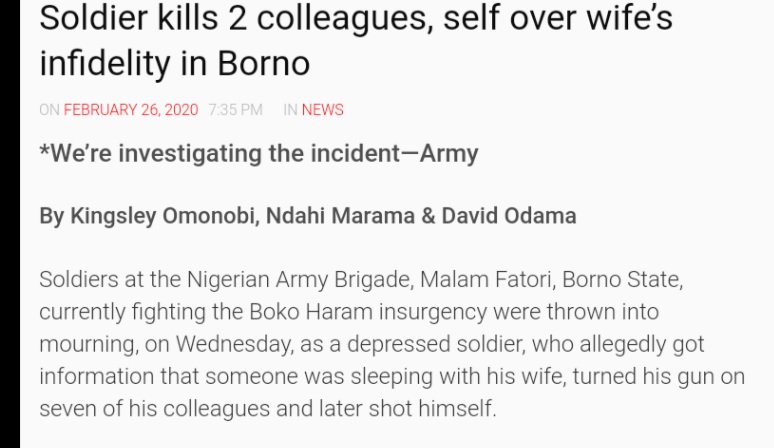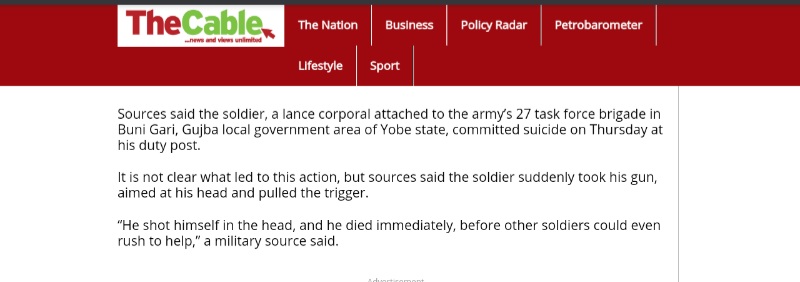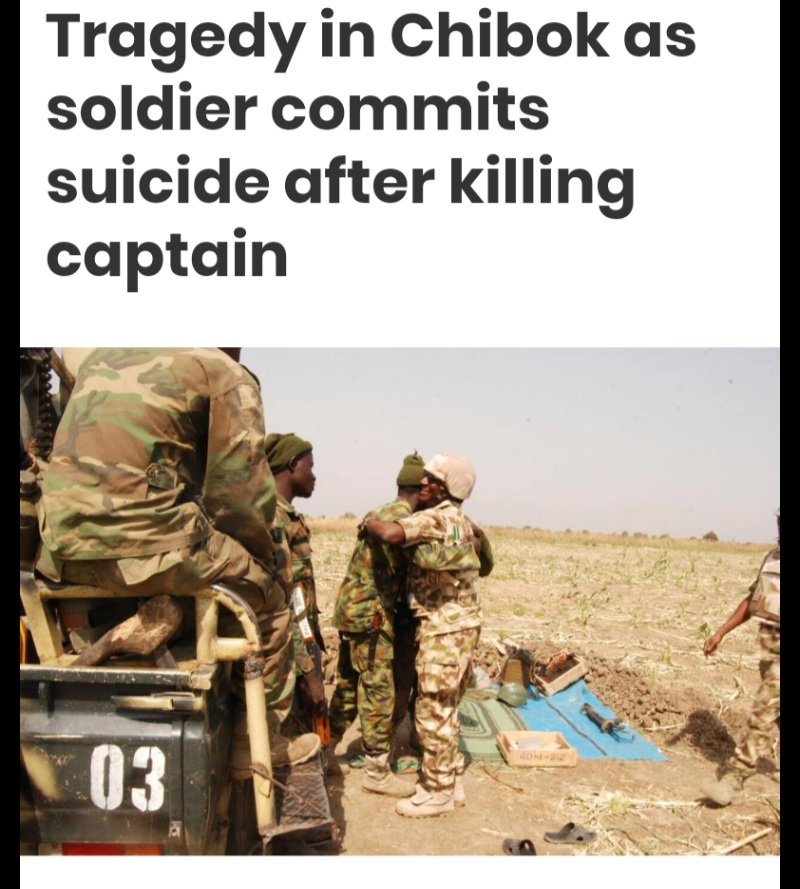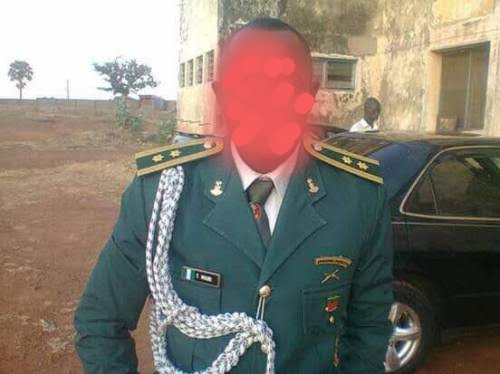The Angel You Know
Only few days are more memorable & joyous like the ones were a serviceman is posted out of the frontlines or operation ground back to his unit. But this was not the case for Mrs B, wife of a Lance Corporal (name witheld)
Only few days are more memorable & joyous like the ones were a serviceman is posted out of the frontlines or operation ground back to his unit. But this was not the case for Mrs B, wife of a Lance Corporal (name witheld)
In the middle of 2014, just 2 weeks after her husband returned to his parent-unit for routine duties, tragedy struck. Lance Corporal B who had resumed base duties, abandoned his post, trekked home with his duty rifle. In their sleep, he killed his wife & 3 kids. He shot himself
Lance Corporal B was described by many as 'easy-going, quiet & very reserved'. An acquaintance, who knew him later revealed to me that B had spent 4 years in the North East, touring multiple frontline units in that period.
Cases of long deployments in the North East amongst officers and soldiers prosecuting the different operations in the country are common. One that is easy to recall is that of late Colonel Bako, who died from ambush injuries, after serving an incredible 7 years in the frontlines.
I always interact with lots of younger folks interested in having military careers. When I tell them of the multiple deployments, they are always thrilled and think they would love the adventure. Well, this is not always as you think my friend until you wear the shoe.
There are officers & soldiers today who have served for 5-7 years in this long fight & still serving, which means they have been leading ground operations or flying platforms for 2 ranks ( from captain &flight lieutenant to lieutenant colonels & wing commanders).
Such long deployments and over stay are resulting to tragedies like in the one of B. Few weeks ago, Uzonna Maduabuchi, a private, was sentenced to death.
Uzonna's crime: In 2020, he emptied 9 bullets on his superior, Lieutenant Ngorgi of the 202 battalion, Bama.
Uzonna's crime: In 2020, he emptied 9 bullets on his superior, Lieutenant Ngorgi of the 202 battalion, Bama.
Ngorgi, who had just married, was said to have denied the private a pass due to unit exigencies. A pass is a written document authorizing servicemen to travel out of their units for a specified period.
These could be attributed to manifestations of PTSD (Post Traumatic Stress Disorder).
I say this because in 2015 I met one of the most silent fighters of this disorder, an Army Major (now a lieutenant colonel).
I say this because in 2015 I met one of the most silent fighters of this disorder, an Army Major (now a lieutenant colonel).
Seeing her for the first time, with her hair packed in a ponytail & covered in a jungle hat, I almost mistook her for a male officer. A psychologist, she went overboard to help soldiers struggling with PTSD.
She moved from one frontline unit to another, interacting with these men to find ways to help. It was during one of such visits, we met.
Her words, 'This battle is from 2 sides. The one from the enemy & the one within. And in both, we have to fight as a team because the angel you think you know today may become the devil himself if you dont fight PTSD'.
I would keep saluting the incredible work she did there.
I would keep saluting the incredible work she did there.
Stay High
In November 2017, Captain Mani, serving in Chibok tried disarming one Sergeant Silas who was assaulting a civilian. Silas would later turn his rifle on the Captain, kill him and commit suicide. Silas was drunk.
In November 2017, Captain Mani, serving in Chibok tried disarming one Sergeant Silas who was assaulting a civilian. Silas would later turn his rifle on the Captain, kill him and commit suicide. Silas was drunk.
Alcohol and drug abuse could be a manifestation of this disorder, especially in battle-hardened men, those who have stayed long in the frontlines. In recent times, the services have responded by cracking down on its members found culpable of drug abuse.
But whether this is a solution is a different question all together. There are men who have wept and genuinely want to stay off these vices but the will to change is not enough. The truth is the job is difficult. Plain & simple.
In one of my visits to Rann in 2016, a soldier, holding a tea concotion, said, 'Oga, once I take this tea, I go just dey alright. I fit dey like this till tomorrow, no shaking'.
Bills
Last year April, I got a call from one of the men who had once wept that he wanted his demons buried. His family took the sacrifice and enrolled him in a rehab center. His mood swings and nightmares had become a problem.
Last year April, I got a call from one of the men who had once wept that he wanted his demons buried. His family took the sacrifice and enrolled him in a rehab center. His mood swings and nightmares had become a problem.
I heard the excitement in his voice - electric and sharp. He sounded like a man about stepping out of a long, dark tunnel. But his family paid alot to help him. PTSD treatment is multi-disciplinary & could last as long as 2-4 years. Annual fees averagely runs into millions.
Alot of folks I have spoken with believe it would be reasonable for the country to have a rehab center for our troops. As theatres of operations keep opening and soldiers keep having long stays in these areas, PTSD manifestations would remain a problem.
Unfortunately, shorter deployments is not going to be immediate because of paucity of soldiers over time. This is the reason you see a particular crew fighting for long, with just short breaks in between.
For a system that globally worships macho-culture, where young men & women see it a norm to bottle up their emotions, difficult exposures would break these bottles once in a while.
Pre, on and post-deployment counselling for easy social integration is the way to go. A dedicated rehab center for troops would be fantastic as well.
Mental health is a serious issue & must be treated as one. After all, these men, after the long & multiple battles, would retire to live in civil settings. We all deserve a normal life.
National service is not a death sentence.

 Read on Twitter
Read on Twitter